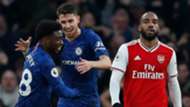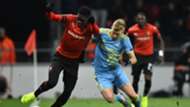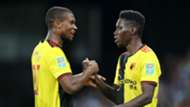The two clubs contesting the FA Cup this weekend have been locked in a battle for the continent's loyalties for the last three decades
The decline of local league football in Sub-Saharan Africa in the 90s coincided almost perfectly with the rise in popularity of the English top flight.
As the Premier League spread its wings and beamed a glossy, well-produced spectacle pregnant with history across the globe, a race for the soul of African football fans ostensibly began.
Much of the fandom within the continent before then was centered on Manchester United and Liverpool, the two behemoths of the English game in the decade that straddled the formation of the Premier League. However, the rise of Arsenal as a force, heralded by the arrival of Arsene Wenger in 1996, introduced another horse into the race.
While the Gunners did not enjoy the hegemonic success of United, or have the storied European history of Liverpool, they quickly gained emotional buy-in through Wenger's affinity for African players.
The Frenchman had previous in this sense: while at Monaco, he had famously blooded George Weah. Wenger left such a profound imprint on the 1995 Fifa World Footballer of the Year that Weah admits "there was no way [he] would have made it in Europe" without that guidance.
“He was a father figure and regarded me as his son. This was a man, when racism was at its peak, who showed me love,” Weah told The Guardian in 2017.

Upon taking over Arsenal, Wenger signed Weah's Liberian compatriot Christopher Wreh, and after winning the double in his first full season in charge, he brought Nigeria international Nwankwo Kanu to Highbury in January 1999.
This singular act served to boost the club's popularity on the continent. Kanu had been named Africa's best player three years prior, and would go on to achieve icon status at Arsenal, win multiple FA Cups and league titles, and win the Africa Footballer of the Year award a second time.
Wenger returned frequently to the wellspring of African talent, cementing Arsenal's pride of place on the continent with the recruitments of Cameroon midfield dynamo Lauren – who he would repurpose as a right-back – and Kolo Toure. Both would play key roles in the fabled Invincibles season in 2003/04 as the Gunners won the title without losing a single game. It remains, to date, Arsenal's last league title.
A wave of change had already begun to shake up English football in 2003, when Roman Abramovich bought London club Chelsea. While a raft of new signings quickly made the Blues formidable, it was not until the following summer, and the arrival of Jose Mourinho, that the club became a major player in the league.
Chelsea did have an African presence in the late 90s in the form of Celestine Babayaro, and had the versatile Geremi on the books as well. Really though, it was the signings of, first Didier Drogba and, then, Michael Essien that ramped up the Blue's popularity in African football.

It was a good moment too: both were star players for national teams that were experiencing a return to relevance on the international stage. Ghana and Ivory Coast were en route to maiden participations at the World Cup, and Essien and Drogba respectively carried the hopes and aspirations of their nations.
It was also important that they wrested the prodigious John Obi Mikel away from the grasp of Manchester United. Aged just 20 at the time of his arrival at Stamford Bridge, he was not yet the star of Nigerian football, but it was clear he was going to be.
And so it was that, just as the balance of footballing power in London was shifting from N5 to SW3, so were Africa's loyalties. Chelsea-mania promptly spread all over West Africa especially.
The arrival of Emmanuel Adebayor at Arsenal briefly saw that swing once more the other way. The towering Togo international, by virtue of his Nigerian roots as well as a monstrous 2007/08 season which saw him named Africa Footballer of the Year, was also able to elicit the adulation of Africa's most populous country once again, albeit for a relatively brief period before his acrimonious departure in 2009.

Bar the acquisition of Gervinho in 2011, the Gunners would not enter the market for a key African addition until Pierre-Emerick Aubameyang was signed for a club record fee in January 2018.
For their part, Chelsea have seen the likes of Demba Ba and Samuel Eto'o play fleeting, but often memorable roles.
It is helpful to view the stranglehold of these two clubs on the African continent as a bit of a stalemate. As far as Africa Footballer of the Year awards go, on the Arsenal side both Adebayor and Aubameyang have had the honour; on the Chelsea side, Drogba.
There is, naturally, a stronger history of trophy success on the Chelsea side of things: alongside Drogba, Salomon Kalou was a lynchpin of the Blues' 2012 Champions League triumph.
Both clubs have leaned heavily on players of African extraction, and have been rewarded both in terms of silverware and, crucially, in the growth of their respective fanbases on the continent.






